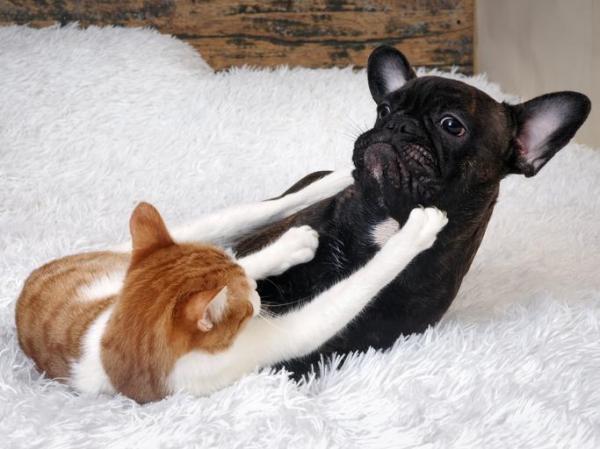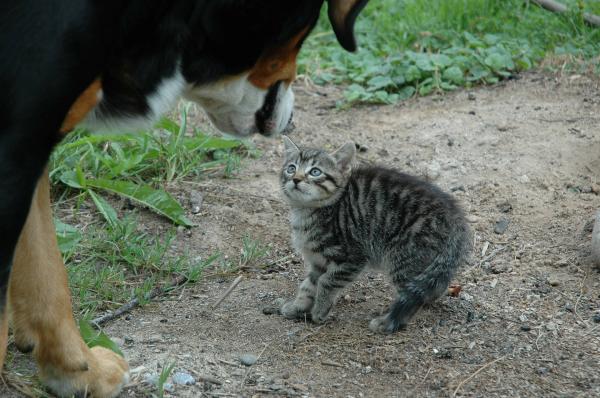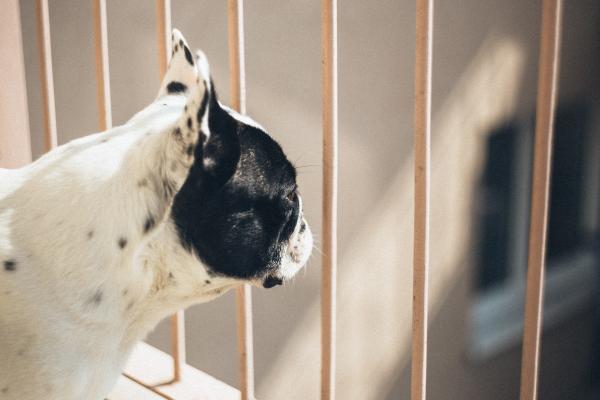
Although phrases such as ‘fighting like cats and dogs’ remain in our modern vernacular, cats and dogs can truly live in harmony. However, if we want to share our home with a cat and dog at the same time, certain guidelines need to be followed. Much of this has to do with socialization and the personal history of either companion animal. This is why it is not unheard of for a cat to keep attacking a dog when they live together.
At AnimalWised, we show why a cat showing aggression to a dog needs to be looked at in context. Whether the cat starts attacking the dog all of a sudden, the cat's attacks are unprovoked or if the cat and dog have never been cordial, we show you why this might be. We also provide the best ways to try to bring harmony between a cat and dog.
Why is my cat aggressive towards my dog?
The mere presence of a dog in a home does not have to create aggression in a cat. Cats and dogs can get along very well and even become the best of friends. This is due to the process of domestication. In the wild, they would see each other as rivals for resources and may even see each other as prey. Since we provide all of their food and security needs, such rivalry may not be present.
However, there are reasons why a cat may attack a dog. It is usually out of fear and insecurity, especially if they are the smaller animal. To know why the cat may be aggressive toward the dog, we need to look at the context of the situation. Reasons include:
- Poor socialization: if your feline never came in contact with a dog when they were developing as a kitten, it is possible they will be scared of them as an adult. It is an understandable response to the danger of the unknown.
- Negative experience: even cats which have been socialized may have a negative experience with a dog which sets them back. It can trigger a highly stressful situation which causes the cat to attack as a way to defend themselves from perceived aggression.
- Dog does not respect boundaries: although a cat may not be scared of dogs, it is possible a friendly dog may not know a cat's limits. Even though a puppy or adult dog is only trying to play, the cat can feel bothered. As a response, the cat attacks with scratching and biting to stop the dog.
- Protecting resources: although domestication helps a cat live in a safe environment, they are still territorial animals. They will feel the need to defend their territory if it is threatened. For this reason, a cat may attack the dog if they think they are a threat. This happens most commonly when a new dog enters a home where the cat was already ‘queen of the castle’. It can even happen when the newcomer is another cat or a different animal. They may not be happy to share their space and the attention of their human guardians, the latter being a precious resource as well.
- Result of stress: if the cat is stressed for whatever reason, they may attack a dog out of frustration. Perhaps the presence of the dog is acting as the stressor. It could also be that some other problem is leading to the cat attacking the dog out of stress. Even a physical sickness could result in mental stress which causes the cat to attack.

Do cats attack dogs for no reason?
As you can see, there are various reasons why your cat may attack your dog. Often, this will happen when the cat and dog first meet. However, it is also possible that a cat will suddenly attack a dog, whether awake or sleeping. The attack may be unprovoked on the part of the dog, but this doesn't mean the cat does it for no reason.
While we have shown you the main reasons why a cat attacks a dog, you should know it can be a complicated issue. Every cat is an individual and their own circumstances will vary. However, it is important to remember that cats are sensitive and they crave routine. Bringing a dog into the home can be a great disruptor, so we should be careful of our cat's needs when considering adoption of a new pet.
Lastly, we need to be sure the cat is actually attacking the dog. Cats can be just as playful as dogs, even more so in some circumstances. Be sure the cat is attacking the dog out of aggression and not simply playing. Also, judge the dog's responses and see if their own boundaries are being crossed.
What to do when your cat is attacking your dog
When our cat attacks our dog it can be very alarming. When it keeps happening, we can become even more worried. For the sake of everybody in the home, we need to bring peace. In very serious cases, we will need to seek the guidance of a veterinarian specialized in ethology to help solve the situation.
Before you go to a professional, it is possible you can help improve their relationship at home.
Keep the cat and dog separated
One of the reasons a cat may show aggression toward a dog is due to a poor introduction between the two. Separate the cat and dog so they can have their own space, but make sure they are aware of each other's presence. Depending on whether the dog is entering a home with a cat living there already or vice versa, there are different approaches:
- If your cat initially lived in the home and just adopted a dog, it's not a good idea to suddenly revoke access to all areas. The cat needs to be reassured their security is not being taken away. Let the dog slowly enter the cat's territory so they are comfortable.
- When the cat is arriving in the home, don't give them full access. Let them slowly explore and find their own spaces where they can feel secure and comfortable. Often these may be high up spaces where the dog can't reach.
You can also use synthetic pheromones to help the cat feel safe in the home. These pheromones help the cat feel relaxed and may help them better adapt to a home. Spray them on surfaces in the home to help them feel reassured.
If the dog is a puppy, then we will need to ensure we start their basic training immediately. Puppies are still learning how to interact with their environment, so they may cross the cat's boundaries unintentionally. By teaching them basic commands, you can help the dog to know these boundaries and prevent an attack from happening.
Bring them together little by little
After some time of separation, you may see that the cat and dog become more used to each other's presence. How long this takes will depend on the individual circumstances. When this happens, we can start to introduce the pair little by little.
In short supervised sessions, we can keep the dog on a leash and hold them at a safe distance from the cat. As long as the cat remains calm, you can bring them closer. Look out for warning signs from the cat in case they become too stressed. This could include hissing or swiping at the dog. In these cases, it may be best to bring the dog back or even try again another time.
Don't forget to reward the cat when it is over. It is best to have somebody else on hand to help in case the cat does have an adverse reaction.
The purpose of this process is to desensitize the cat. This way they will become indifferent to the dog's presence. To do this we will bring the dog and cat closer together very gradually, but return them to their separate areas afterwards.
If your cat is only aggressive when the dog approaches a specific element, it could be because they are protecting a resource. In these cases, you must perform the same exercise in the presence of this element so that the feline sees that the dog does not want to take it away.
In cases where the cat is attacking a puppy, we will also need to ensure the puppy is getting used to them. This means helping the puppy know to respect their boundaries also.
Ensure the cat feels safe
We need to ensure the cat knows they are going to be protected in your home. This means they should have spaces they can go where the dog can't. A walkway attached to the wall is a good accessory which can help the cat to feel more protected.

My cat keeps attacking my dog
There may be cases where even this reintroduction attempt might not be sufficient. The cat may be fine one moment, but then begin hissing at the dog the next. In these cases, it can be very difficult to determine the underlying reason for this. If this does happen, it is important we get to the bottom of it.
The best way to do this is speak to a cat specialist or ethologist. They will be best be able to work out the reasons for the cat hissing and attacking the dog. They will also have certain techniques to reduce possessiveness and engender a feeling of security in the cat. Only in extreme circumstances will the dog and cat not be able to get along eventually.
If you want to read similar articles to My Cat Keeps Attacking My Dog, we recommend you visit our Behavioral problems category.